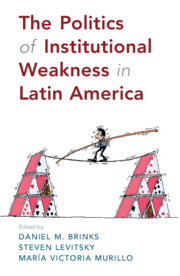Book contents
- The Politics of Institutional Weakness in Latin America
- The Politics of Institutional Weakness in Latin America
- Copyright page
- Contents
- Figures
- Maps
- Tables
- Contributors
- Acknowledgments
- 1 The Political Origins of Institutional Weakness
- 2 When (Electoral) Opportunity Knocks
- 3 The Stickiness of “Bad” Institutions
- 4 Presidential Crises in Latin America
- 5 Coercion Gaps
- 6 Aspirational Laws as Weak Institutions
- 7 The Social Determinants of Enforcement
- 8 A Multilevel Approach to Enforcement
- 9 What/Whose Property Rights?
- 10 Imported Institutions
- 11 Social Origins of Institutional Strength
- 12 Conclusion
- Bibliography
- Index
7 - The Social Determinants of Enforcement
Integrating Politics with Limited State Capacity
Published online by Cambridge University Press: 06 May 2020
- The Politics of Institutional Weakness in Latin America
- The Politics of Institutional Weakness in Latin America
- Copyright page
- Contents
- Figures
- Maps
- Tables
- Contributors
- Acknowledgments
- 1 The Political Origins of Institutional Weakness
- 2 When (Electoral) Opportunity Knocks
- 3 The Stickiness of “Bad” Institutions
- 4 Presidential Crises in Latin America
- 5 Coercion Gaps
- 6 Aspirational Laws as Weak Institutions
- 7 The Social Determinants of Enforcement
- 8 A Multilevel Approach to Enforcement
- 9 What/Whose Property Rights?
- 10 Imported Institutions
- 11 Social Origins of Institutional Strength
- 12 Conclusion
- Bibliography
- Index
Summary
The weak or selective enforcement of parchment rules is a widely recognized problem in Latin American and developing states. In Chapter 1, Brinks, Levitsky, and Murillo theorize institutional weakness as the gap between the way social interactions should be structured by institutions and the actual way social interactions occur. We define enforcement as the set of actions that the state takes to reduce the size of that gap. Our point of departure is that enforcement is often uneven and therefore constitutes a key element of the politics of institutional weakness; when rules are enforced is equally, if not more, important than the content of the rules themselves.
In this chapter, we build an account of the political and societal determinants of enforcement to elucidate why and how weak institutions gain relevance and how strong institutions might, or might not, emerge from state action.
- Type
- Chapter
- Information
- The Politics of Institutional Weakness in Latin America , pp. 161 - 182Publisher: Cambridge University PressPrint publication year: 2020
- 11
- Cited by

